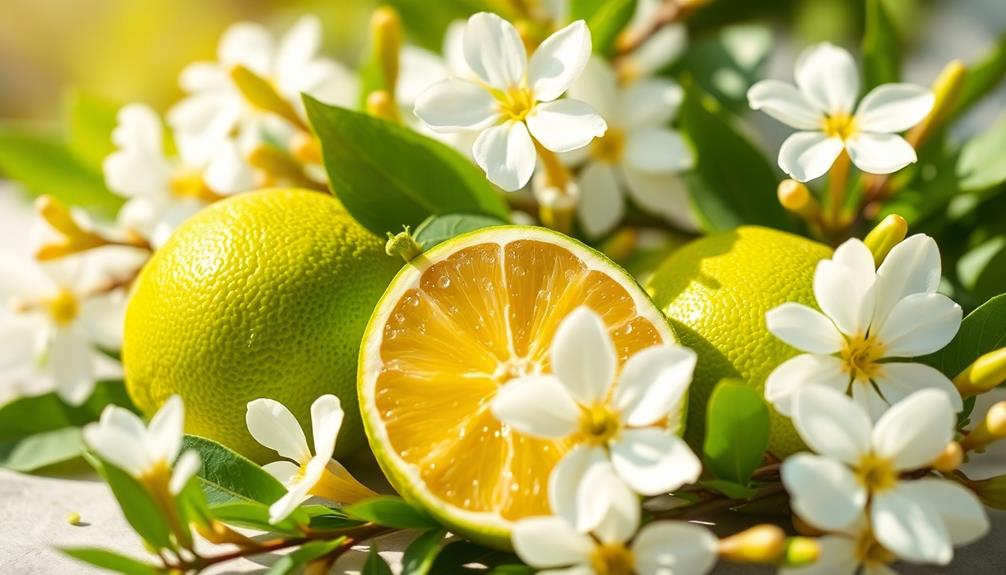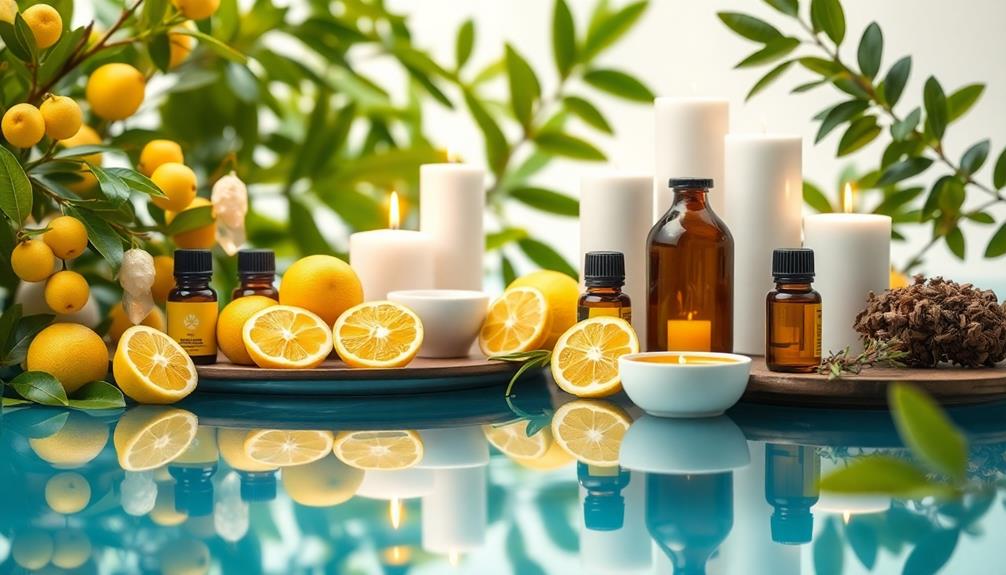Bergamot smells like a delightful mix of zesty lemon and sweet orange, creating a cheerful and refreshing scent. It has light floral notes and a hint of spice, which adds sophistication to its aroma. You might feel uplifted and energized when you catch a whiff of it! This pleasant fragrance is popular in perfumes and combines well with other lovely scents like sandalwood and jasmine. Many people enjoy it in Earl Grey tea, too! Just imagine a sunny day when you think of bergamot, and you'll understand its joyful essence. There's so much more to discover about this fascinating fragrance!
Key Takeaways
- Bergamot has a vibrant and refreshing aroma that combines zesty citrus notes with sweet undertones reminiscent of lemon and orange.
- The scent features light floral hints and subtle spicy undertones, adding depth and sophistication.
- Its uplifting qualities promote feelings of joy and energy, making it popular in aromatherapy.
- Bergamot's essential oil includes aromatic compounds like limonene and linalyl acetate, contributing to its unique fragrance profile.
- This aroma is often associated with sunny days and is a key ingredient in Earl Grey tea, symbolizing elegance.
Introduction

Bergamot's smell captivates with its zesty, refreshing, and crisp notes, instantly transporting you to a place filled with nature's vibrancy. This delightful scent is like a burst of sunshine, combining the sourness of lemon and the sweetness of orange.
When you breathe it in, you might even notice subtle floral hints and a touch of spice, making it truly unique among citrus scents.
The aroma of bergamot comes from essential oils extracted from the rinds of bergamot oranges. These oils contain important compounds like limonene and linalyl acetate, which give bergamot its wonderful character.
Many people adore this scent because it's not just refreshing; it's uplifting too! You might find that it brightens your mood and helps you feel more energized.
Whether you're using it in aromatherapy or enjoying it in perfumery, bergamot's scent is perfect for enhancing your day. It brings joy and relaxation, making it a favorite for many.
Description of the Smell

When you encounter bergamot's aroma, you're greeted by a vibrant fusion of zesty and sweet notes that dance on your senses. The bergamot scent is a delightful mix of lemon's sourness and orange's sweetness, creating a bright citrus fragrance that's hard to resist.
As you breathe it in, you may notice lightly floral notes and subtle spicy undertones, adding a touch of sophistication to the smell of bergamot. The refreshing citrus scent of bergamot invigorates the senses, while its complex layers create a well-rounded olfactory experience. Much like what to expect from argan oil, this aroma offers a balance of richness and refinement, leaving you feeling both grounded and uplifted. Together, these natural elements enhance not only the scents you enjoy but also the sensory experience as a whole.
This aroma of bergamot isn't just refreshing; it's also uplifting! Many people find that it energizes their mood and brings feelings of joy.
Because of its complex scent profile, bergamot is a popular choice for perfumes and aromatherapy. You can even enjoy its health benefits! The essential oil, derived from bergamot rinds, contains special compounds like limonene and linalyl acetate, which contribute to its sharp, sweet fragrance.
Source and Composition

Extracted from the rinds of bergamot oranges, the scent of bergamot is a luxurious essence that comes with a hefty price tag—around 100 fruits yield only 3 ounces of essential oil.
This rich bergamot essential oil has a special blend of aromatic compounds that makes it unique. The main compounds include limonene, linalyl acetate, and linalool.
Limonene gives you that sharp, sweet, and slightly bitter aroma, while linalyl acetate adds fruity and floral notes. Linalool, on the other hand, brings in a fresh, lavender-like scent.
When you combine these, you get a complex aroma, often described as a delightful mix of lemon sourness and orange sweetness, with hints of floral and spicy undertones.
This citrus scent isn't just a treat for the nose; it's also a favorite in perfumery and aromatherapy.
People love using bergamot essential oil in their fragrance compositions and mood-boosting blends.
Typical Scenarios or Environments

The unique aroma of bergamot makes it a perfect fit for various scenarios and environments. Its refreshing scent is fruity and citrusy, reminding you of sunny spring and summer days. You can use bergamot oil in aromatherapy to create a relaxing space when you feel stressed, aligning with the idea that relaxation enhances manifestations, as discussed in the power of sleep and dreams.
The uplifting smell helps boost your mood, making it great for calming moments. In home settings, lighting a bergamot candle can fill the room with a sophisticated atmosphere. It blends beautifully with scents like sandalwood and jasmine, inviting you to unwind after a long day.
You might also find bergamot in personal care products, like lotions and soaps, giving your daily routine a fresh burst of energy. If you're at work, consider using bergamot to enhance productivity. Its cheerful fragrance can help maintain a positive environment, keeping you focused and inspired.
Whether you're at home, in the office, or enjoying a spa day, bergamot's delightful scent creates a space of joy and relaxation. So, embrace this lovely aroma and let it brighten up your world!
Emotional or Cultural Associations

Bergamot's scent evokes a range of emotional and cultural connections that resonate with many people. When you breathe in the scent of bergamot, you might feel joy and freshness. Its citrusy aroma can remind you of sunny days spent outdoors, which is why it's popular in aromatherapy to uplift moods.
The benefits of bergamot oil include promoting relaxation and easing stress, making it a favorite in many cultures. Additionally, the power of imagination can enhance our emotional experiences, allowing us to connect more deeply with scents like bergamot and their transformative possibilities in our lives the power of imagination.
In Italian culture, bergamot has a special place. It's been used in folk medicine for centuries. You may also know bergamot as a key ingredient in Earl Grey tea, which is part of British tea traditions. This connection adds to its cultural significance, symbolizing elegance and refinement.
The unique aroma of bergamot blends bright citrus notes with subtle floral hints. This versatility makes it popular in high-end perfumes and Mediterranean cuisine.
Health or Safety Considerations

When using bergamot essential oil, it's crucial to be aware of potential health and safety considerations. First, some people may experience skin sensitivity, especially if they use the oil and then go outside in the sun. This can lead to phototoxic reactions, which aren't fun! To avoid this, always conduct a patch test on a small area of skin before applying it widely.
It's also important to note that ingesting large amounts of bergamot, especially in concentrated forms like oil, can lead to toxicity. So, steer clear of taking too much!
If you're pregnant or breastfeeding, make sure to consult with a healthcare professional before using bergamot. Safety data is limited, and it's better to be safe than sorry.
Lastly, if you're taking medications, be cautious. Bergamot oil can interact with certain drugs, especially those metabolized by the liver. Always check with your healthcare provider if you're unsure.
Final Thoughts

Many people find bergamot's unique scent to be a delightful addition to their everyday lives. This essential oil offers a zesty, refreshing aroma that blends sharp citrus notes with lightly floral and subtly spicy undertones.
When you breathe in bergamot, you might notice hints of lemon sourness and orange sweetness, creating a distinct scent that stands out from other citrus fragrances.
One of the most popular uses for bergamot is in Earl Grey tea, where its wonderful aroma enhances the flavor, making each sip even more enjoyable. Its uplifting scent can evoke feelings of joy and warmth, turning any moment into something special.
Bergamot's versatility doesn't stop there! It harmonizes beautifully with other fragrances like sandalwood, jasmine, and vetiver, making it a favorite choice for perfumes and aromatherapy.
Frequently Asked Questions
What Is the Closest Scent to Bergamot?
When you explore scents similar to bergamot, you'll find that a mix of lemon and orange captures its essence well. Grapefruit, mandarin, neroli, and ylang-ylang also evoke similar refreshing and sweet citrus notes.
How Would You Describe the Smell of Bergamot?
When you encounter bergamot, you'll sense a zesty, refreshing aroma that blends sharp citrus with sweet floral notes. It evokes joy and sophistication, making you feel invigorated, like a bright spring day.
Is Bergamot a Feminine Scent?
Bergamot isn't strictly feminine; it's a versatile scent that appeals to everyone. You'll find its bright, zesty notes in both women's and men's fragrances, making it a popular choice across various styles and preferences.
What Do Bergamot and Patchouli Smell Like?
When you smell bergamot and patchouli together, you'll notice the bright, zesty freshness of bergamot mingling with patchouli's deep, earthy warmth. This combination creates a balanced fragrance that's both uplifting and grounding, enhancing your mood.









